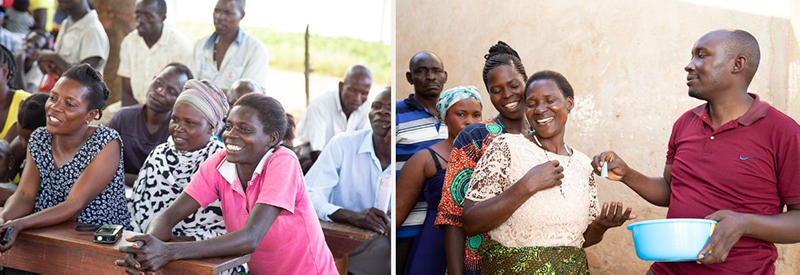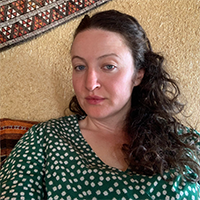Written in collaboration with Alexis Cooley, Associate Board Member, Green Empowerment
The election of the water committee in Nyakabale, Uganda was set for the morning. At the agreed upon time, roughly 40 community members arrived. Of those present, only two were women. Seeing this, the election was delayed. Teams from Green Empowerment and The Water Trust, the organizations working with the community, conducted spot mobilization. The teams moved from house to house around the community to encourage women to join the election. Due to the morning meeting time, many women were occupied with responsibilities such as preparing lunch and caring for children. The meeting was reconvened a few hours later when more women were available. Women participants increased from two to 87 by election time.
“The morale of the participants was high, they actively participated, cheered their candidates and sang moral boosting songs.”
– Simon Mugume, WASH Manager, The Water Trust
Both men and women candidates openly spoke about their ideas and plans for water system management. Utilizing a secret voting approach community members agreed upon, candidates were nominated for various positions, with each role requiring at least two candidates before a vote could proceed. Notably, the commitment to gender inclusivity shone through, as six of the nominated candidates were women, including two out of the three candidates vying for the position of Chairperson. Inclusivity was on display in the community. Together, the community members fostered equal representation in leadership roles within the water committee. In fact, Joann (pictured below), a respected and loved community facilitator, ultimately won the position of Chairperson.

Bridging Lessons from Ecuador to Uganda
“In Uganda, we are in the middle of professionalizing the rural water sector with a community-based management approach, where the government is working in collaboration with communities and service providers.”
– Osbert Atwijukye, Africa Program Director, Green Empowerment
In Masindi District, Uganda, a transformative initiative is taking shape as Nyakabale and surrounding villages strive to secure sustainable water access. This project establishes a water network that will reduce the time people spend traveling to get water. It takes steps toward a system that supports household connections in alignment with the vision of local government. While new technology and innovative solutions often dominate discussions surrounding water projects, the community’s recent endeavor highlights the importance of community-based management in the pursuit of long-term success. In collaboration with Green Empowerment and The Water Trust, community leaders are not only constructing a new water system for nearly 3,500 people across seven villages, but also emphasizing community ownership and sustainability.
In Uganda, it is a national requirement to establish a proper management structure before handing over a system to the community and The Water Trust has a wealth of experience supporting community management. The new element in this effort was to create a real sense of competition and democratic engagement around who ultimately gets to lead the Water Committee. In November, Green Empowerment’s Africa Program Director, Osbert Atwijukye, traveled to visit Green Empowerment’s robust water access program in Ecuador. There he witnessed the community buy-in created when an election has real competition and voters feel they are choosing who will lead their water system. He brought these observations back to The Water Trust.
Recognizing the importance of elections, The Water Trust, which already practices elections for management committees, decided to implement a similar approach in Nyakabale. This strategic decision aligns with their nuanced approach. Notably, they conducted elections not only for the central Water Committee but also for each tap stand’s self-help group, a departure from conventional pipe scheme management approaches. This decentralized system ensures that local communities have a say in selecting leaders for their specific water points, fostering a more effective and inclusive management structure.

The Rise of a Water Committee
“The use of secret voting gives us the confidence that the board members elected are trusted by the community and we look forward to seeing that trust culminate into the board working effectively with support from the community to ensure the system is sustained.”
– Simon Mugume, WASH Manager, The Water Trust
The journey toward competitive elections for a community-based management system began with a concerted effort to raise awareness in Nyakabale and surrounding villages. The Water Trust connected with community leaders including government representatives from Kiryandongo District, sub-county leaders, religious leaders, representatives from institutions, and other community members.
In anticipation of the election, community leaders and participants in the water system construction discussed ideas for a water committee including key positions and responsibilities, and desirable qualities of board members. Recognizing the importance of gender inclusivity, the need for women to participate as candidates and voters was emphasized. In unanimous agreement, community leaders pledged to shoulder the responsibility of engaging community members in the election of a water committee.
Ripples of Change
“Having a trusted team of leaders is [the] starting point for sustainability of any community-based project.”
– Simon Mugume, WASH Manager, The Water Trust
With the water committee established, the next phase involves training by The Water Trust in the operation and maintenance (O&M) of the system. This training ensures that the committee is well-equipped to manage and sustain the water system, securing a future where Nyakabale and surrounding communities can enjoy reliable access to clean water.
Beyond the pipes and pumps, the commitment to inclusivity, representation, and community ownership ensures that the ripples of this initiative will create a lasting impact. The collaborative efforts of community leaders, government representatives, and institutions showcase the strength that can emerge when communities unite for a common cause.
A huge thank you to Jackson Kemper Foundation, AllPeopleBeHappy Foundation, Deerfield Foundation, Steve Willis Foundation, and charity: water for funding this project.

Alexis Cooley is a finance coordinator for communities developing water and energy projects in Oregon, USA. She is a published research scientist on climate and local adaptation, who is passionate about diversity and inclusion.
